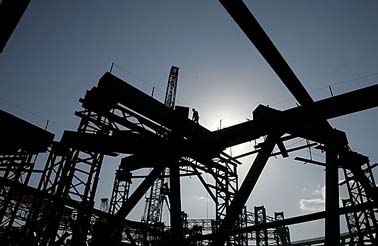|
Organizer: 2008 Games no drain on taxpayers
(Reuters)
Updated: 2006-03-05 17:11
Beijing's 2008 Olympic Games will be entirely self-funding and not divert
funds from reforms aimed at helping China's rural poor, a leading Chinese sports
official said on Sunday.

A man works at the
construction site of the National Olympic Stadium, also known as the
'bird's nest', in Beijing March 1,
2006. [Reuters] |
Organiser Tu Mingde said fears expressed by members of China's
parliament, the National People's Congress, that the country could not
afford to spend too much on the Games illustrated a misconception about the
source of the $2 billion operational budget.
"I think these concerns are understandable and it means we haven't got our
publicity quite right," said Tu, a former secretary-general of the Chinese
Olympic Committee and president assistant of the Beijing organising committee
(BOCOG).
"We have to explain to the public that the funding of the Olympic Games is
very different from organising national games.
"For national games, you get nothing but for an Olympics all the money to
build the venues and run the Games comes from marketing.
"As far as the operation of the Games is concerned, the Olympic Games will
not use any money from the taxpayers."
Zhang Guiyu, one of the 3,000 delegates to this week's National People's
Congress, said the country could not afford an "extravagant" Games while so many
of China's rural population lived beneath the poverty line.
Premier Wen Jiabao on Sunday announced government plans to spend 339.7
billion yuan ($42.3 billion) this year on upgrading agriculture, and billions
more on rural social services in a "major historic task".
Tu, speaking on the sidelines of the annual meeting of an advisory body to
parliament, said the International Olympic Committee's (IOC) 11 global sponsors
were already in place and BOCOG had signed nearly as many local deals.
"Hopefully we will make a profit, but our aim is to make both ends meet," he
said. "That's very important.
"That's good for the Games and good for the people because that means we
don't have to use any money from the pockets of the people, or any money from
the government."
The operating costs of the Games are, however, dwarfed by the estimated $40
billion being spent on upgrading Beijing's infrastructure and tackling pollution
in the Chinese capital.
Tu said these improvements were the responsibility of Beijing's city
government and would have been made anyhow.
"Regardless of whether you have the Olympic Games or not you still have to
have these improvements," he said. "All it's done is accelerated the process by
a few years."
|